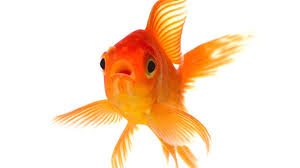
Goldfish
Goldfish are hardy and adaptable but require proper care to thrive. They should be kept in a spacious tank with at least 20 gallons per fish, as they produce a significant amount of waste. The tank should have a good filtration system and be kept at a temperature between 65-75°F (18-24°C). Goldfish prefer a well-oxygenated environment, so a bubbler or air stone is recommended.
Useful Fact: Goldfish grow according to the size of their environment. If kept in a small tank, their growth can be stunted, leading to health issues.
Goldfish are omnivores and require a varied diet. They thrive on high-quality goldfish pellets or flakes, supplemented with fresh vegetables like peas, spinach, or lettuce, and occasional protein sources like brine shrimp or bloodworms.
Useful Fact: Overfeeding is a common issue with goldfish. It’s important to feed them small amounts 2-3 times a day, only what they can consume in a couple of minutes.
Goldfish are generally robust, but they can be susceptible to several diseases, such as ich, swim bladder disorder, and fin rot. Poor water quality, overfeeding, and inadequate tank size are common contributors to these issues.
Useful Fact: Regular water changes (about 20-30% weekly) and maintaining good water quality are key to preventing health issues in goldfish.
Goldfish don’t require traditional grooming, but their environment must be kept clean. Regular water changes, gravel vacuuming, and filter maintenance are essential to their care.
Useful Fact: Goldfish produce more waste than many other fish, so it’s crucial to maintain a robust filtration system to keep the water clean.
Goldfish are intelligent and can be trained to recognize their owners, come to the surface for food, and even perform simple tricks like swimming through hoops.
Useful Fact: Training your goldfish with food rewards can stimulate their minds and make them more interactive pets.
Goldfish enjoy exploring their environment, so providing them with plants, rocks, and tunnels can help keep them entertained. They also enjoy interacting with floating toys or bubbles.
Useful Fact: Rearranging decorations occasionally can stimulate your goldfish’s curiosity and prevent boredom.
Goldfish are generally peaceful but should not be kept with aggressive fish that might nip at their fins. It’s important to choose tankmates that are compatible with their size and temperament.
Useful Fact: Avoid placing sharp objects or decorations in the tank, as goldfish can injure themselves, especially those with delicate, flowing fins.
Essential accessories for a goldfish tank include a reliable filter, a heater (if needed), an air pump for oxygenation, and decorations that provide hiding spots without sharp edges.
Useful Fact: Adding live plants to a goldfish tank can help improve water quality and provide natural grazing for the fish.
Goldfish are social animals and can be kept in groups, provided there is enough space in the tank. They generally get along well with other goldfish and peaceful species.
Useful Fact: Keeping goldfish in groups can make them more active and reduce stress, as they enjoy the company of their own kind.
When transporting goldfish, use a container that allows enough space for them to move freely. The container should be filled with water from their tank and covered to prevent spills. Avoid drastic temperature changes during transport.
Useful Fact: Transporting goldfish in a plastic bag with plenty of air and water from their tank is a common and safe method, especially for short trips.
Goldfish are curious, social, and active swimmers. They can recognize their owners and often swim to the front of the tank when approached. They enjoy interacting with their environment and are known for their peaceful nature.
Useful Fact: Goldfish can become bored or stressed in a bare tank, so providing an enriched environment with plants and decorations is important for their mental well-being.
There are generally no specific legal restrictions on owning goldfish, but it’s important to ensure they are kept in suitable conditions to avoid ethical concerns.
Useful Fact: In some places, releasing goldfish into the wild is illegal and harmful to local ecosystems, as they can become invasive and disrupt native species.




